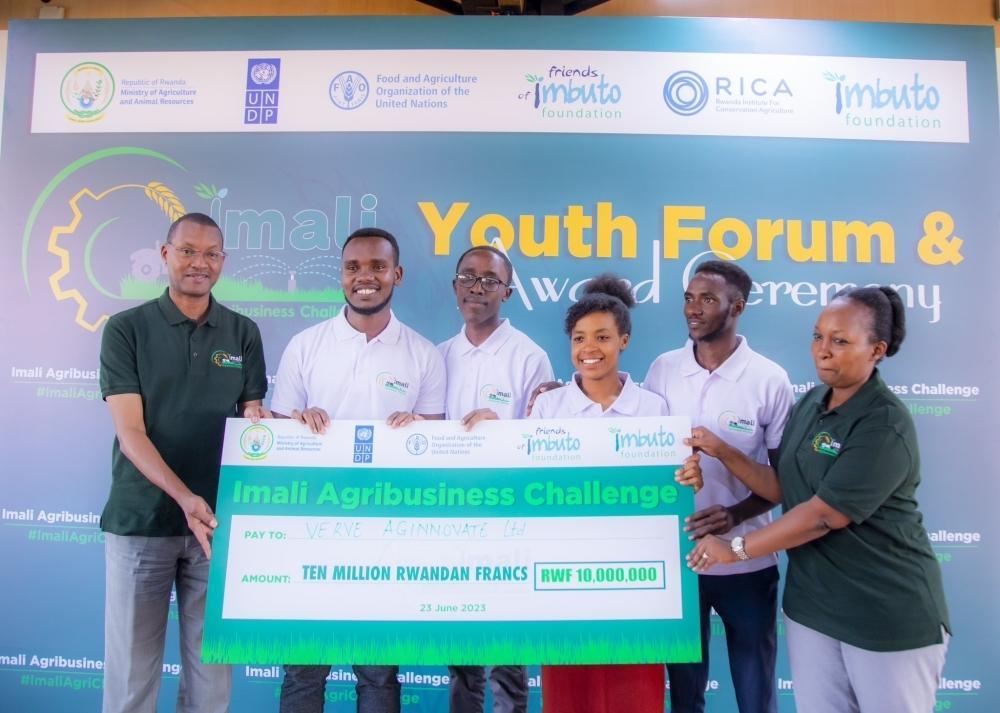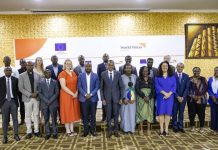Africa-Press – Rwanda. Imbuto Foundation on Friday, March 7, launched the second phase of its Imali Agribusiness Challenge, which aims to empower and scale up youth entrepreneurship in the agriculture sector for sustainable national development.
Speaking during the launch of Imali Agribusiness Challenge phase 2, during the Dusangire Ijambo talkshow on the public broadcaster, the Director General of Imbuto Foundation, Elodie Shami, said that phase 2 plans to award 10 top projects that will be selected by a jury composed of agribusiness experts.
According to Imbuto Foundation, each winning project receives Rwf10 million to help scale up its business and impact.
Youths who wish to participate will register through Imbuto Foundation’s website.
“We encourage a person who has a project which they think Imali Agribusiness Challenge can help to grow, to participate in this competition,” Shami said.
Given the impact of the initiative based on the growth of the winning projects in the first phase, and the young people’s interest in agribusiness potential, Shami encouraged more partners to come onboard and endorse it to support more young people.
“It would be better if we move from 10 projects and award 20 or 30 projects,” she said, pointing out that for the first phase of the challenge that was launched in 2023, “we initially expected to award four projects, but we awarded 15 projects” thanks to sponsors who chipped in.
For the first phase, she said, about 1,400 young people participated in the challenge. She observed that the relatively large number of youth participants in the project shows the interest of young people in agribusiness.
Youth experience a higher unemployment rate (18 per cent) compared to adults (12.3 per cent), according to the Labour Force Survey Quarter 4, 2024, by National Institute of Statistics of Rwanda.
Shami said that supporting young people in agribusiness can help address unemployment.
“We realise that many young people started understanding the value of agriculture, and we wish that as we expand this project, we get more partners than we currently have so that we are able to support the growth of more,” she said.
Gildas Kwitonda, one of the Imali phase 1 winners, said that he ventured into mushroom farming after realising that it has the potential for income generation, requires a relatively small area, and is carried out throughout the year – bypassing the challenge posed by rain shortage.
“I realised it is something that can offer me the opportunity to develop in a short period,” he said.
Talking about the impact of the challenge, he cited a six-fold increase in his monthly mushroom seed production.
“The money I received helped me to expand my business from producing 2,000 mushroom spawns to 13,000 spawns per month currently,” he said, adding that he employees eight permanent workers, up from the initial three.
Alice Mukamugema, the Director General of Agriculture Value Chain Management and Trade at the Ministry of Agriculture and Animal Resources, said that many young people started engaging in agriculture and livestock, with the majority growing vegetables and fruits, as well as involved in poultry and pig farming.
“They are also engaged in seed multiplication in line with the government’s plan to be self-reliant in domestic seed production instead of relying on imports. So, the youth ventured into that, which is a very important action that enables us to increase productivity,” she said, adding that agriculture has many opportunities to offer in terms of job opportunities.
Criteria considered in selecting project participants include that a project should: be in the agriculture value chain; be in the implementation stage; have a physical working place for implementation; and should be sustainable and have a plan for job creation.
The project owner should also be a youth between 18 and 30 years old; and the project must have a registration certificate from Rwanda Development Board (RDB) or Rwanda Cooperative Agency (RCA).
The project owner has to attend the mentorship of six months in case their project is selected. The project should also be an environmentally friendly project, should be operational, and engaging other farmers.
For More News And Analysis About Rwanda Follow Africa-Press






